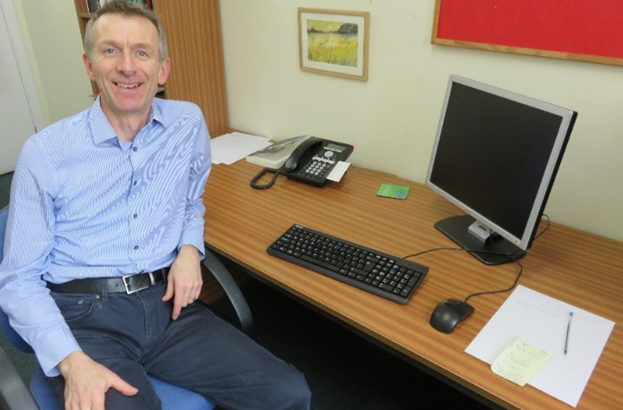Mags Gargan talks to the new chief executive of the Irish Chaplaincy in London
Sixty years ago, the Irish Bishops’ Conference sent nine Columbans to England to minister to the thousands of Irish emigrants there, mainly to those working in the construction and catering industries. This was how the Irish Chaplaincy in London began and it is particularly poignant for the new chief executive, Eddie Gilmore, because his father was an emigrant from Galway working on the building sites in Coventry at the time and his mother, from Newry, was working in a local café. “So they were just the type the chaplaincy was set up to minster to.”
Six decades later, Eddie says the work is as relevant now as ever, but also “very different”. “For many years it was made up of priests and some nuns. Those numbers dwindled and now we have one priest on paid staff and one on the board,” Eddie says, but the “kind of people we are serving has also changed.”
The Irish Chaplaincy is one of the oldest Irish welfare charities in the UK. It offers culturally sensitive support for Irish immigrants and other people of Irish heritage throughout England and Wales, and deals with the most vulnerable and marginalised Irish people in Britain. It provides services in four categories: prisoners, Travellers, seniors and new immigrants.
Adverse effect
“The Irish Council for Prisoners Overseas (ICPO) was set up in response to the large amount of Irish prisoners in British jails and the adverse effect it was having on families back in Ireland, with the lack of access to their loved ones. That is the major service that we are engaged in,” Eddie explains. “There was quite a bit of contact with members of the Travelling community, especially those in the criminal justice system, so that became a specific project in recent years.
“In 2005 our seniors project was set up in response to the quite large amount of Irish people who had fallen on hard times in their senior years and were living alone in London in quite poor and squalid conditions, and often with mental health issues as well. We are in touch with 110 elderly Irish people for pastoral outreach, befriending and advocacy,” he says.
In the last year the chaplaincy supported 782 Irish prisoners in prison in England and Wales, and 300 families back in Ireland. In addition to that they were in touch with 359 Irish Travellers in prison via face-to-face visits and organising Traveller groups in prisons and responding to 30 letters a week. “The Traveller Equality project also provides culturally relevant resources to Irish Travellers in prison,” Eddie says. “It provides advice and resources to another charity called the Shannon Trust which does great work in raising literacy levels among prisoners. We provide grants for £10 for prisoners. In the last year we gave over £10,000 in prisoner aid for phone credit and other basics. We do a lot of work around advocacy and any way people need our help,” Eddie says.
The chaplaincy is also looking into expanding their work with prisoners with a resettlement project to support prisoners on their release. “At the moment we only support people inside prison we would like to be there to help their transition afterwards. There are horrendous levels of reoffending in Britain and we would like to be able to reduce that.”
It is a huge amount of work undertaken by a small team and it goes largely unknown. There is just nine paid staff – seven full time and two part-time – and 18 volunteers. Eddie says he was surprised “by how few volunteers there were with the amount of people in London with Irish connections”, but even though he came from an Irish background himself, he hadn’t heard of the chaplaincy until he saw the job advertised last year.
“The organisation has had a very low profile,” Eddie agrees. Just three months into his new role, one of Eddie’s aims is to raise the profile of the charity and on the day of our interview he had just sent out the charity’s first newsletter in 60 years.
The chaplaincy also has a number of events coming up to celebrate its 60th anniversary. “We will have a celebration Mass on September 24 in Sacred Heart Kilburn, where many Irish settled when they first came over,” Eddie says. “We’ll have Bishop John Kirby of Clonfert, who chairs the Irish Episcopal Council for Emigrants and Bishop Paul McAleenan of Westminster diocese who has oversight for ethnic chaplaincies.
Website
“We are planning an evening of music and theatre in July in the London Irish Centre. We are also planning a pilgrimage walk in the summer which will finish with Mass in Westminster Cathedral.”
The chaplaincy also plans to relaunch its website, launch an overall social media strategy and a number of newspapers serving the Irish community in the UK have agreed to publish articles on its work. “I think we are doing great work and we need to do more and more people need to be made aware of it,” Eddie says.
“We are a small charity with not a very high income. About two thirds of our funding is from the Irish Government’s Emigrant Support Programme and we receive some from the Irish Episcopal Council for Emigrants and from one or two trust funds. Money has been very tight in recent years and one of my big tasks is to make a long-term fundraising strategy so we can carry on what we are doing but ideally expand and I am confident we can do that.”
Eddie also hopes to get more of the younger Irish people who emigrated in the last few years to get involved in the chaplaincy, particularly visiting the elderly Irish. “Potentially there is a lot of young Irish in London who are lonely and it would be of mutual benefit,” he says. “I’d like to think that is at the heart of what we do, that mutuality. It is at the heart of all our work. Each person has something to give and to receive. It is important to build relationships with people, whether that is a prisoner or elderly person or young person recently arrived.”
For more information contact 0044 207 482 5528 or info@irishchaplaincy.org.uk or see www.irishchaplaincy.org.uk


 Mags Gargan
Mags Gargan Eddie Gilmore in the offices of the Irish Chaplaincy in London
Eddie Gilmore in the offices of the Irish Chaplaincy in London